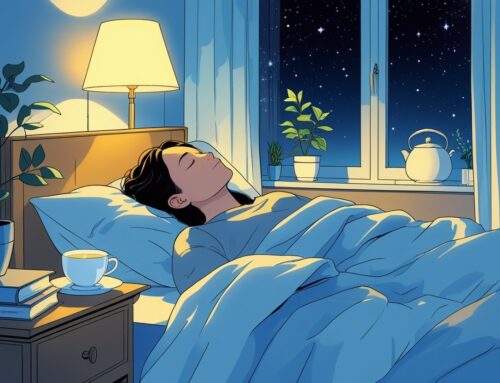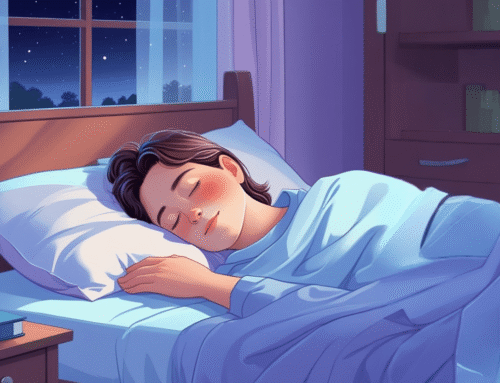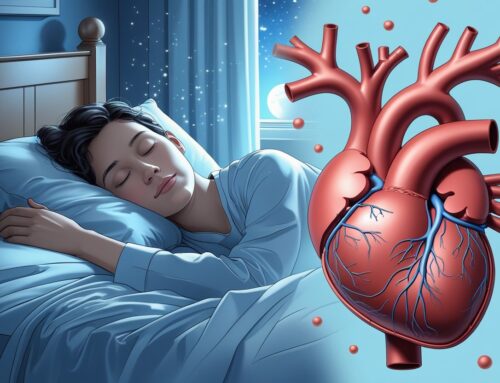Recovering from a concussion has a lot to do with rest. Many people still believe it’s unsafe to sleep after a head injury, but that’s not always true. If there are no serious symptoms, sleep can actually help the brain heal. Good rest gives the body a chance to recover and lowers the risk of more problems.
Still, it’s important to watch for warning signs, especially right after the injury. If someone seems confused, vomits, or acts strangely, they need medical care right away before being allowed to sleep. A doctor should make the call on whether it’s safe. Once the doctor says it’s okay, keeping a regular sleep routine makes recovery easier. It can also reduce common issues people face after a concussion, like headaches or feeling tired.
Finding the right balance matters. Rest is key, but so is paying attention to changes in symptoms. Knowing what to look out for helps both the person recovering and the people taking care of them.
Key Takeaways
- Proper rest aids brain recovery when no severe symptoms appear.
- Staying alert for dangerous signs after a head injury is crucial.
- Healthy sleep habits support faster concussion healing.
- Combining a quality mattress with proper neck and spinal support reduces physical stress during sleep and enhances the body’s ability to recover from concussion symptoms.
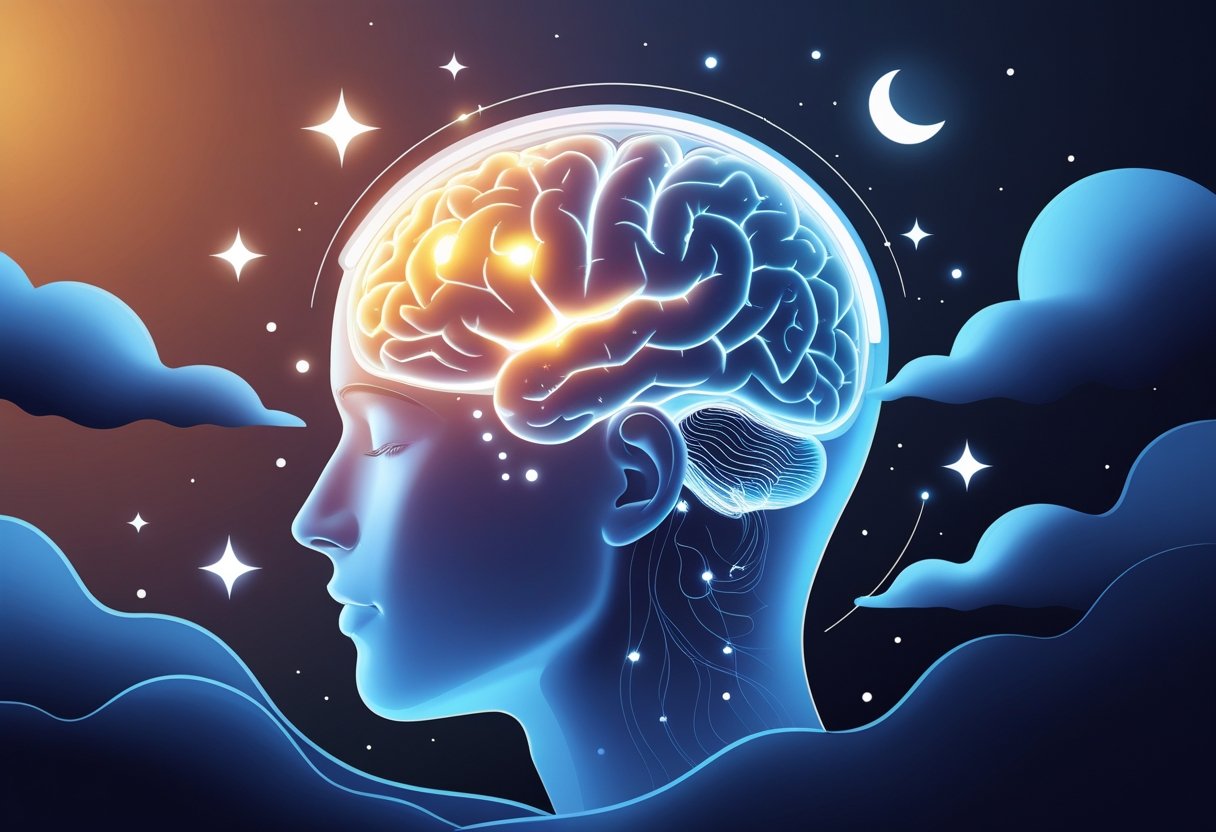
Understanding Concussions
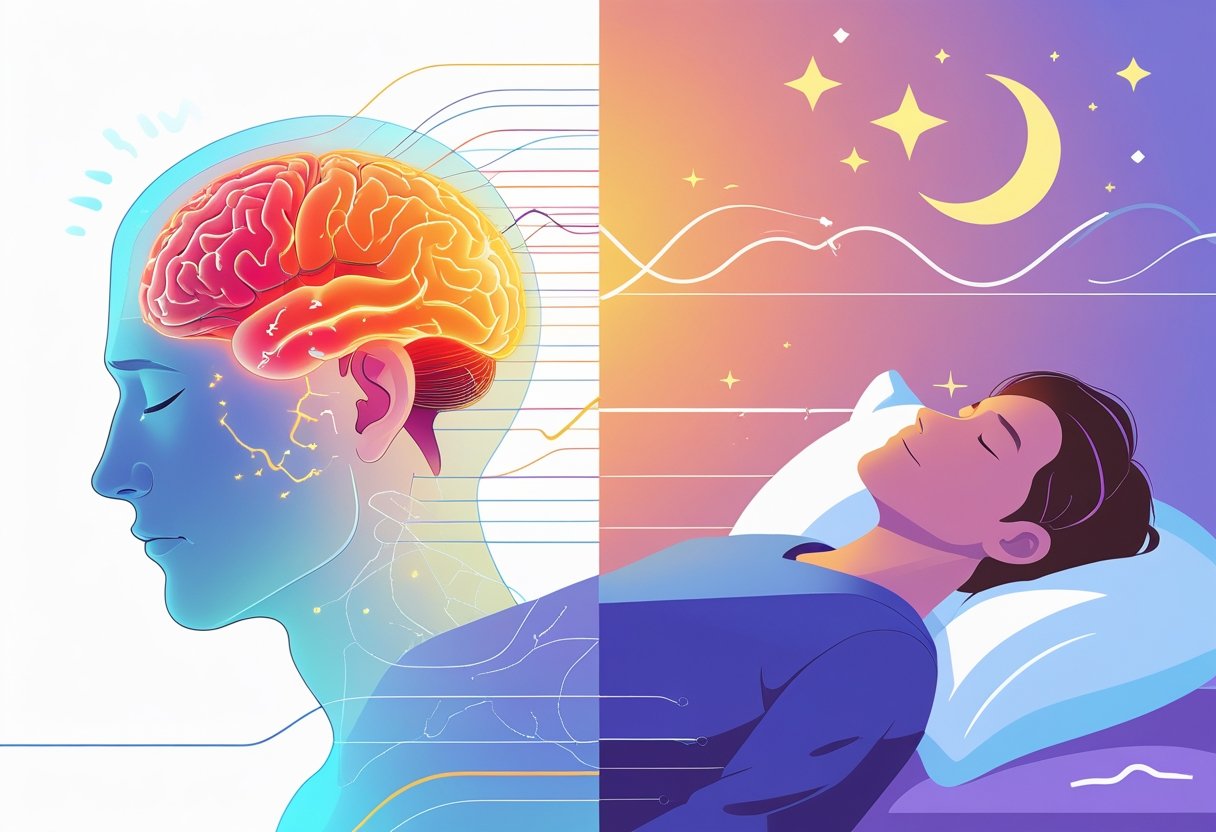
Concussions occur when the brain endures a sudden impact or force. This injury disrupts how the brain functions and can lead to problems such as headaches, dizziness, and sleep difficulties. Learning about the causes, symptoms, and types helps manage recovery, especially regarding rest and sleep.
What Is a Concussion?
A concussion is a mild traumatic brain injury caused by a blow to the head or a sudden jolt. It shakes the brain inside the skull and temporarily affects brain function. Even a minor hit can result in a concussion.
Losing consciousness does not always happen. Symptoms might appear immediately or develop over several hours or days. This injury interferes with normal brain activity but rarely causes permanent damage. Rest, including sleep after a head injury, is important in brain healing. However, watching for symptoms is crucial to avoid further harm or complications.
Symptoms of a Concussion
Concussions bring a variety of symptoms affecting physical, cognitive, and emotional health. Common signs include headache, confusion, dizziness, nausea, and blurred vision. Some people feel tired or struggle with concentration.
Sleep problems like insomnia, fatigue, or excessive sleepiness often follow a concussion. These issues can interfere with recovery and daily activities. Wanting more sleep is normal, yet others may find restful sleep difficult.
Symptoms differ from person to person and can be subtle. When headaches, confusion, or sleep disturbances worsen or continue, seeking medical care becomes necessary.
Severity and Types of Head Injuries
Not every head injury is a concussion. Severity spans from mild to severe traumatic brain injuries. A concussion qualifies as mild but remains a serious health concern. Other types include contusions (brain bruising) and hematomas (blood clots), which sometimes need emergency treatment. Medical professionals assess severity by symptom intensity, loss of consciousness, and imaging results. Sleep after a concussion forms part of treatment, but severe cases might require hospital observation.
Recognizing these differences guides proper care decisions and helps determine the right timing for returning to activities, including rest and sleep routines.
The Relationship Between Sleep and Concussions
Healing after a concussion relies heavily on proper rest, yet the injury usually disrupts normal sleep patterns. Problems such as difficulty falling asleep, staying asleep, or feeling tired during the day frequently occur. Understanding how these changes affect recovery helps guide safe next steps.
Can You Sleep After a Concussion?
Yes, it is usually safe to sleep after a concussion. Rest allows the brain to repair itself by supporting essential healing processes. Many people feel anxious about falling asleep right after a head injury, yet sleep provides exactly what the brain needs. However, initial monitoring remains important. After a concussion, someone should be observed closely for serious symptoms like vomiting, confusion, or trouble waking. If any of these appear, seek medical help immediately. For those without severe signs, sleeping is safe and even encouraged.
Sleep problems such as insomnia or extreme tiredness may develop within days and sometimes last for weeks. These issues are common and reflect how a concussion affects brain function. When sleep disturbances persist long-term, consulting a doctor helps manage recovery effectively.
Is It Safe to Sleep After Hitting Your Head?
In most cases, sleeping after hitting your head is safe if symptoms of a concussion are mild. The idea that people must stay awake to prevent worsening damage is a myth. Still, observing the person initially is crucial.
Anyone who has just hit their head should be checked for serious signs such as loss of consciousness, severe headache, vomiting, or confusion. If these signs are absent, it is safe to let them sleep while checking on them periodically.
If the person can wake fully and respond clearly when checked, sleeping does not add extra risk. Some healthcare providers recommend waking the person every few hours during the first night to ensure they remain alert and responsive.
Why Experts Recommend Rest
Rest is important in concussion treatment since the brain requires time to heal. Sleep clears waste products from brain cells and supports recovery at a cellular level. Lack of rest can worsen concussion symptoms and slow the healing process. Experts stress the importance of both physical and cognitive rest. This includes avoiding activities like sports, excessive screen use, and intense school work, which may strain the brain.
Good sleep habits, including a consistent bedtime and a quiet sleep environment, help improve rest quality after a concussion. Proper recovery often progresses more smoothly when adequate rest combines with medical care and appropriate follow-up.
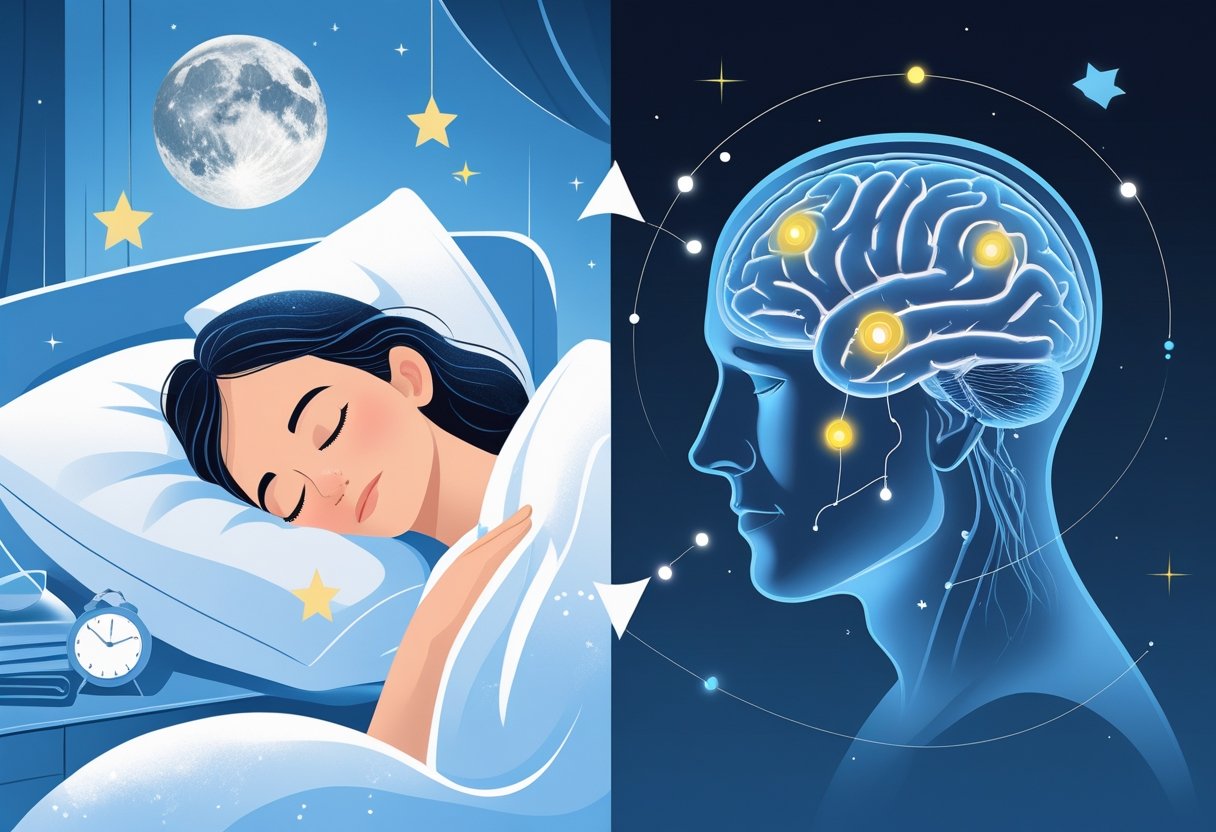
How Long Should You Stay Awake After a Head Injury?
After a head injury, many people ask how long they should stay awake before going back to sleep. The advice depends on age and how serious the injury is. Careful observation and a proper medical check-up are essential for a safe recovery and knowing when it becomes safe to rest.
Guidelines for Adults
Adults do not need to stay awake for a specific period after a head injury unless they show severe symptoms. If they remain alert, walk steadily, and speak clearly, it is safe for them to sleep. The old belief that everyone must stay awake for 24 hours no longer holds up, since research does not support it.
However, they must be watched for any worsening signs like confusion, intense headaches, vomiting, or trouble waking up. Rest and sleep promote recovery, yet if any warning signs appear, urgent medical attention is necessary.
Recommendations for Children
Children need close supervision after a head injury, although, like adults, they do not require a set period of wakefulness. Parents should watch for repeated vomiting, extreme sleepiness, or unusual behavior. When a child appears normal and wakes easily, it is acceptable for them to sleep. Caregivers must still check on them often during the first 24 hours to ensure their condition does not decline.
Special Circumstances and Medical Supervision
Certain head injuries require medical supervision, and in these cases, staying awake longer may be necessary. If a doctor suspects bleeding or brain swelling, they could recommend waking the person every few hours.
In emergency care, constant monitoring helps detect dangerous changes early. Otherwise, rest becomes important once the person stabilizes and shows no serious symptoms. Decisions on when it is safe to sleep depend on how severe the injury is and the doctor’s advice.

Myths and Misconceptions About Sleeping After a Concussion
Many people worry about what happens if someone falls asleep after a concussion. Some believe sleep could worsen the injury or cause serious problems, while others think staying awake keeps the person safer. These ideas stem from misunderstandings about head injuries and recovery.
Common Fears About Sleep and Head Injuries
A common fear is that sleeping after a concussion might cause someone to stop breathing or slip into a coma without waking up. Others worry that brain damage could quietly get worse during sleep. These fears lead many to think it is safer to keep the injured person awake for hours.
Another concern is that if someone goes to sleep, caregivers won’t catch signs of worsening symptoms, like vomiting or confusion. This creates the belief that sleep prevents early detection of dangerous issues such as brain swelling or bleeding.
Why Some Believe You Shouldn’t Sleep
The idea of avoiding sleep after a concussion partly comes from outdated medical advice. Years ago, doctors suggested waking injured people every few hours to check for severe problems.
These old myths spread through homes, sports teams, and even some healthcare settings, fueling fear about resting fully. People usually confuse mild concussion symptoms with those of more serious brain injuries, assuming sleep could hide signs of deterioration.
Evidence-Based Facts
Research shows sleep actually helps the brain heal after a concussion. There is no evidence that sleeping makes the injury worse. Proper rest can speed up recovery and ease symptoms.
Health experts explain it’s safe to sleep if the person wakes easily, speaks clearly, and shows no severe signs like unequal pupils, confusion, or weakness. Serious symptoms call for emergency care, but that concern is separate from sleep itself.
If needed, nurses or doctors might check on the person early on, although it isn’t necessary to keep them awake all night. Poor sleep can slow healing and lead to mood issues after a concussion, so allowing good rest remains essential.
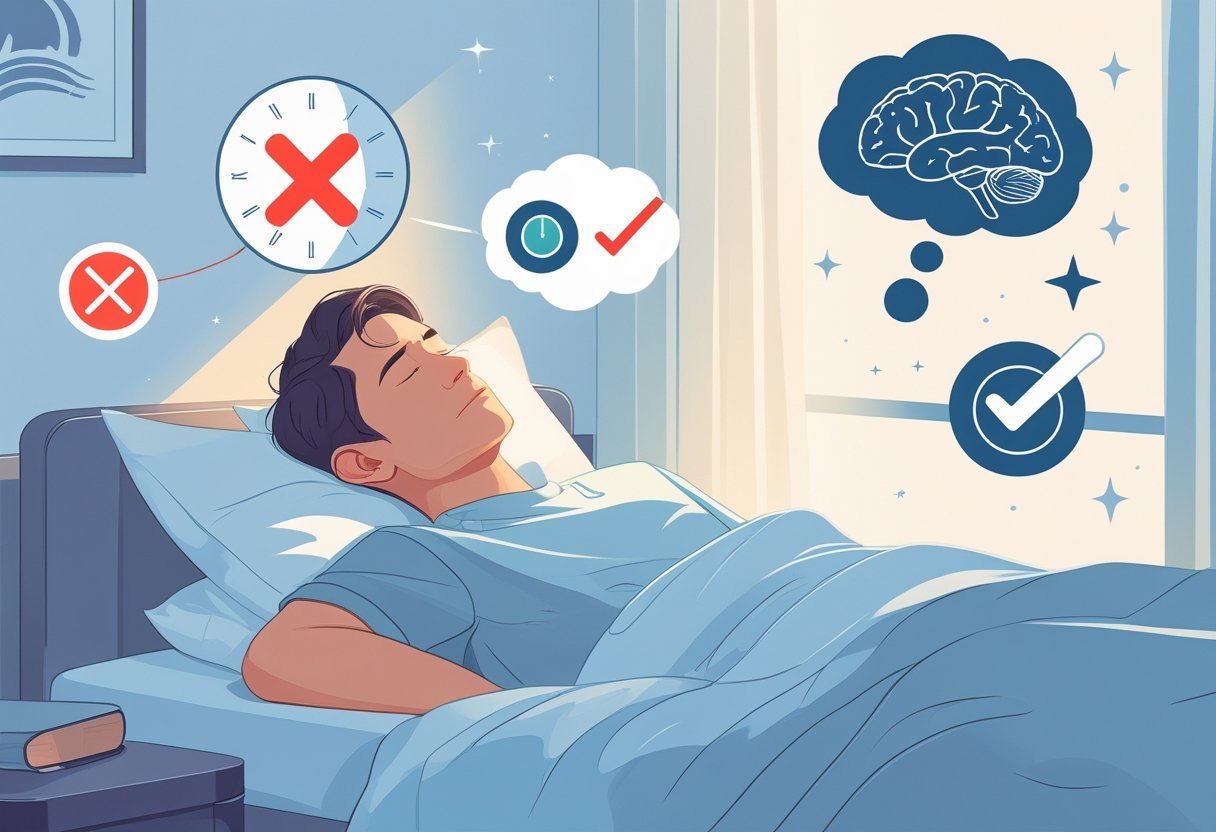
Risks and Complications from Sleeping with a Concussion
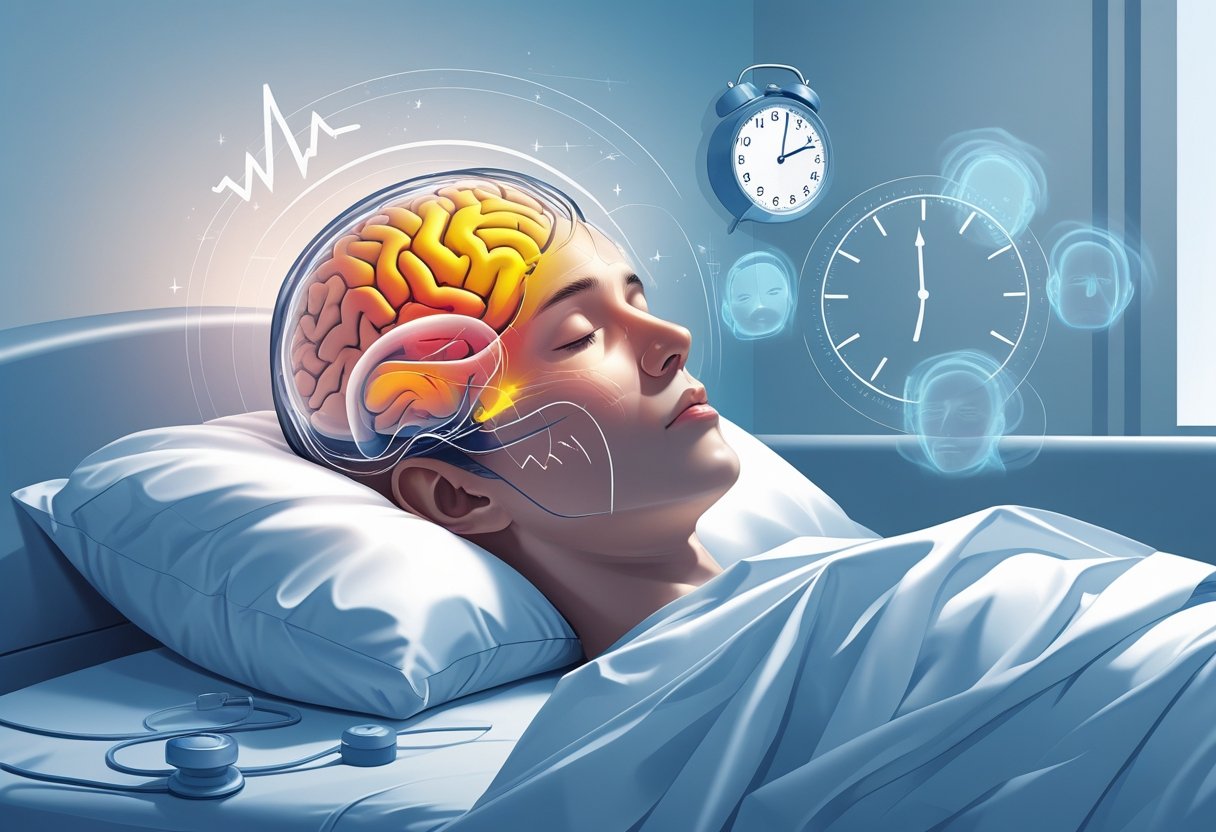
Sleeping with a concussion is generally safe, though certain risks deserve attention. Complications can occur if warning signs go unnoticed or if the injury involves more serious damage. Close monitoring after the incident is crucial to catch any signs of worsening.
Potential Dangers of Sleeping
Sleeping after a concussion aids recovery by giving the brain time to rest. Yet, when injuries such as brain bleeding or swelling exist, sleeping without medical evaluation can delay treatment, which raises the risk of severe harm.
Someone who falls asleep after a concussion and displays serious symptoms may have an underlying issue. A decline in brain function or loss of consciousness can worsen without prompt care. Because of this, doctors usually advise an initial medical check-up to rule out dangerous complications.
Warning Signs to Watch For
Certain symptoms during or after sleep call for immediate medical attention. These include:
- Loss of consciousness lasting more than a few seconds
- Severe headache that intensifies
- Repeated vomiting
- Pupils appearing uneven in size
- Difficulty staying awake
- Seizures or weakness in the arms or legs
If any of these occur, seek emergency care without delay. Even when someone seems able to sleep, ongoing vomiting or unusual behavior may reveal a more serious injury. Careful monitoring after the concussion helps ensure these signs do not go unnoticed.
Symptoms to Monitor After Hitting Your Head
After a head injury, certain symptoms require close attention. Changes in alertness, unusual tiredness, and shifts in sleep patterns may indicate the injury’s severity. Observing these signs helps decide if medical care is necessary.
Sleepiness and Fatigue
Feeling sleepy or tired after a head injury happens often. The brain uses energy to heal, so rest becomes essential. Mild fatigue or needing extra sleep can be normal during the first day. However, excessive sleepiness or difficulty staying awake could signal a problem. If someone is hard to wake, naps for long periods, or cannot respond well, urgent medical evaluation is necessary.
Changes in usual energy levels, such as weakness or confusion, may point to a more serious injury. It’s important to monitor how tired the person feels over time, not just immediately after the injury.
When Being Sleepy Is a Concern
Sleepiness after a head injury becomes concerning when it occurs alongside other symptoms. These include severe headache, vomiting, dizziness, or uneven pupils. Such signs suggest complications like concussion or brain swelling.
If a person “hits their head and now feels sleepy” but still talks clearly, moves without difficulty, and has steady pupils, rest is usually safe. Yet if sleepiness worsens or coordination and alertness decline, seek immediate medical help.
Monitoring changes in behavior, alertness, and physical control during the first 24 to 48 hours proves critical. If the person cannot stay awake or respond clearly, do not let them sleep without consulting a doctor first.
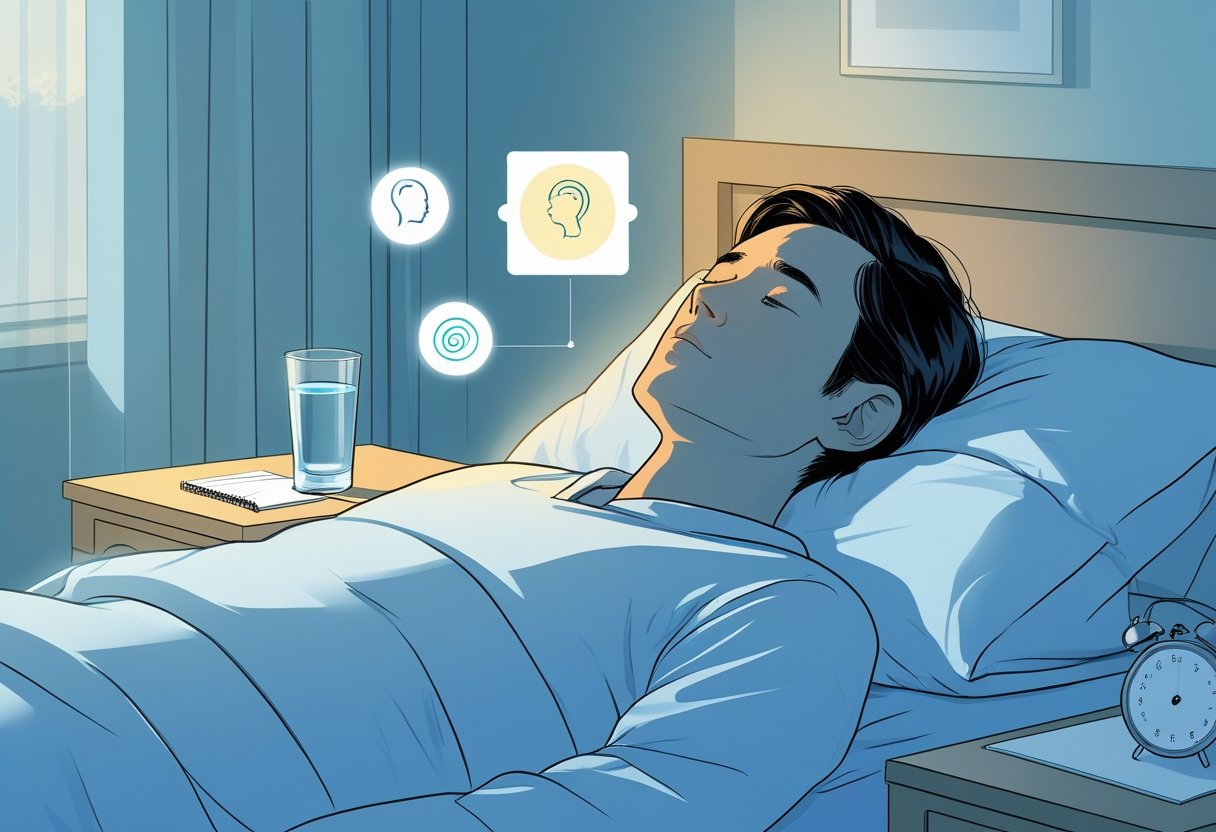
Safe Practices for Sleep After Concussion
After a concussion, rest helps in healing. Still, knowing how to sleep safely, when to watch for symptoms, and recognizing signs that require medical care is important for recovery.
How to Safely Rest After a Head Injury
Sleeping after a concussion remains safe and helps the brain recover. The person should lie down in a comfortable position and avoid activities that worsen symptoms. Avoid bright lights and loud noises before sleep, as these may increase headaches or dizziness.
Calm surroundings support better rest. Limit screen time at least an hour before bed. Follow a regular sleep schedule by going to bed and waking at consistent times. Drinking water and avoiding caffeine or alcohol before sleeping also benefits recovery.
If symptoms such as confusion or vomiting appear, continue resting but increase monitoring. Safe sleep after a concussion means prioritizing quiet and calm without forcing the person to stay awake if they feel tired.
Monitoring During Sleep
Waking a person regularly after they fall asleep following a head injury proves unnecessary. If they remain alert and can hold a conversation before sleeping, monitoring can remain passive. Watch for signs such as severe headache, repeated vomiting, seizures, or difficulty breathing during sleep. A trusted person may check for subtle changes by gently trying to rouse the individual when needed.
Keeping a symptom log that notes any worsening or new problems helps health professionals evaluate progress. People who sleep well tend to recover faster, but those with worsening symptoms require closer monitoring.
When to Seek Medical Attention
Seek medical help immediately if the person experiences:
- Loss of consciousness longer than a minute
- Unequal pupil size
- Difficulty waking after sleep
- Seizures or convulsions
- Severe headache or vomiting
These signs may indicate a more serious injury than a concussion alone.
If confusion, weakness, or difficulty speaking develops, urgent evaluation becomes necessary. Do not delay care based on sleep alone. Medical professionals can rule out complications such as brain bleeding or swelling, which demand prompt treatment.
For safe sleep after concussion, resting calmly and watching for danger signs ensures proper recovery. If symptoms change or worsen, seeking medical advice remains critical.
Long-Term Effects and Recovery
Sleep problems follow a concussion and can persist for weeks or months. These issues influence how well the brain heals and how quickly recovery occurs. Understanding the connection between concussion and sleep guides better care and improves outcomes.
Recovery Timeline and Sleep Quality
Most people recover from a concussion within two to four weeks. During this period, sleep patterns frequently change, leading to difficulty falling or staying asleep. These disruptions delay healing because the brain depends on sleep for repair.
If sleep problems continue beyond a month, they may indicate post-concussion syndrome. This condition involves ongoing symptoms such as headaches, dizziness, and persistent sleep disturbances. Patients with chronic sleep troubles face a higher risk of slower recovery.
Monitoring sleep quality throughout recovery provides doctors with insight into a patient’s progress. Poor sleep may predict longer symptom duration and greater impact on daily life.
Managing Ongoing Sleep Issues
Long-term sleep problems after concussion require careful management. Avoiding sleep medications remains preferable since these drugs might cause side effects or worsen symptoms over time. Instead, methods like good sleep hygiene and light therapy offer help. Establishing a calm bedtime routine, reducing screen time, and keeping consistent sleep hours enhance sleep quality. In some cases, cognitive behavioral therapy for insomnia (CBT-I) delivers positive results.
Doctors often investigate other causes of sleep disturbance before attributing it solely to concussion. Addressing sleep problems directly increases the chance of full recovery and lowers the risk of chronic symptoms.
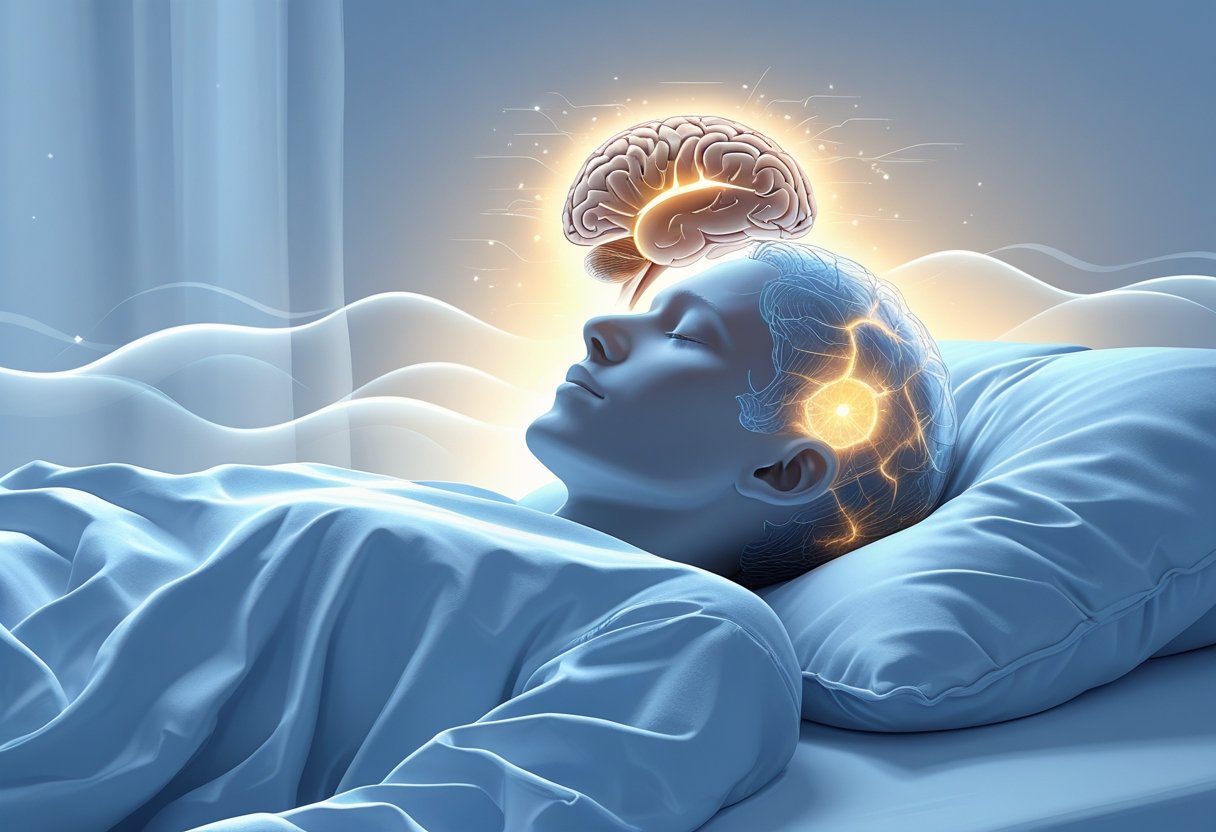
Mattresses and Concussion Recovery For Restorative Sleep
A good mattress supports restorative sleep, which is essential for healing after a concussion. Proper sleep allows the brain to repair cells and boost memory. A mattress that eases pressure on the body can reduce discomfort and encourage longer and deeper rest.
Key mattress features for concussion recovery include:
- Firmness: Medium-firm mattresses provide balanced support and help to prevent aches that interrupt sleep.
- Pressure relief: Mattresses made with memory foam or latex help reduce pressure points, which lowers tossing and turning.
- Temperature regulation: A mattress that remains cool prevents waking from overheating ,and enhances sleep quality.
A poor mattress may increase discomfort and worsen the sleep problems experienced after concussions. Those recovering should avoid mattresses that are too soft or sagging, as these can cause poor alignment and pain.
Adjusting the sleep environment is also important. Supporting the neck or aligning the spine with pillows complements a good mattress. A comfortable setup reduces physical stress on the body and allows the brain to concentrate on healing.
If you want a mattress that has firm support along with pressure relief and cooling benefits, the Logan & Cove Frontier Hybrid Mattress is a great choice. It features a soft Euro-top cover, ecoLuxe cooling gel foam, and micro and pocketed coils designed to provide balanced comfort that supports healing. On top of that, it comes with a generous 365-night trial and a 15-year warranty to allow plenty of time to decide if it fits your needs.
More than just comfort and support, this mattress uses eco-friendly and health-conscious materials. The CertiPUR-US certified foams guarantee low emissions and minimal chemical exposure for a safer sleeping environment during recovery. Its breathable construction encourages airflow to keep the mattress cool all night, a key factor in maintaining deep and uninterrupted rest.

Frequently Asked Questions
Sleep is important in healing after a concussion. There are specific safety concerns and common misunderstandings about when and how to rest following a head injury. Knowing the risks and appropriate care methods helps manage symptoms effectively.

